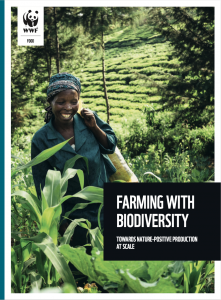Farming for Biodiversity. Towards nature-positive production at scale
On the 23rd of April, the World Wildlife Fund (WWF-NL) published a report on “Farming with Biodiversity – Towards nature-positive production at scale’. Our food system is currently the biggest threat to biodiversity. The report shows that food production and nature protection can go hand in hand. Moreover, nature-friendly agriculture can contribute to food security and make the agricultural system more robust against climate change.

Better for nature and people
Nature-friendly agriculture, also known as agroecology, has many more advantages. Instead of producing as much food as possible, which has all kinds of negative consequences such as damage to water, air and soil quality and the large-scale loss of nature, the aim of agroecology is food production in balance with nature. Agroecology makes use of local farmers’ knowledge and encourages diversity in crops and feather varieties. This makes farmers less dependent on pesticides and fertilisers, the diversity of food is greater and both yields and incomes are more stable, even in a changing climate.
Large-scale transition
Around the world, research, evidence and experience shows that it is possible for agricultural systems within multi-functional landscapes to provide food, feed, fuel and fibre as well as habitat and corridor functions for biodiversity, climate resilience and enhanced ecosystem services. Agroecology is gaining recognition and is being put into practice all over the world, both on small farms and in larger-scale agricultural systems. Agroecological approaches provide a pathway to protect nature, manage agriculture in ways that enhance the richness of biodiversity and restore the ecosystem functions of degraded systems, by applying a holistic and interconnected set of ecological and social concepts to the design and management of food and agricultural systems.
The ten elements of agroecology can be applied at the farm, landscape and food system level, to realize nature-positive production at scale. New technologies that work with nature rather than against it, such as strip farming, robotisation and sensors, can help. To feed the world, protect nature and combat climate change, a broad and large-scale change is needed on both small and large farms, through more area-specific cooperation with nature conservationists and others. For this change, farmers must be supported by governments, suppliers, financiers, food companies and supermarkets.
Joint responsibility
Agroecology can be the solution to achieve global food security and at the same time restore nature. With this report WWF-NL shows that things must change, but also that they can change. The recommendations in the report can inspire farmers, politicians, governments, businesses, civil society organisations, citizens and scientists to contribute to this.

